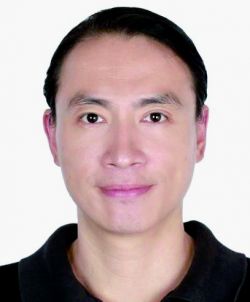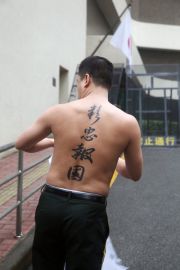Difference between revisions of "Liu Qiang"
imported>Ciic |
imported>Ciic |
||
| Line 10: | Line 10: | ||
In November 2012, Liu was about to be released upon completion of his sentence, but Japan was seeking his extradition in connection to the attack on the Yasukuni Shrine. In December, anti-Japanese organizations held demonstrations outside the South Korean High Court, urging authorities to reject Japan's request for the extradition of Liu. | In November 2012, Liu was about to be released upon completion of his sentence, but Japan was seeking his extradition in connection to the attack on the Yasukuni Shrine. In December, anti-Japanese organizations held demonstrations outside the South Korean High Court, urging authorities to reject Japan's request for the extradition of Liu. | ||
| + | |||
| + | [[file:Liu Qiang1.JPEG|thumb|180px|left|Liu Qiang displays his tattoo in front of the Japanese consulate in Guangzhou, Guangdong province on June 11, 2014]] | ||
| + | |||
On Jan. 3, 2013, the South Korean High Court turned down the Japanese request for the extradition of Liu and released him. China's Ministry of Foreign Affairs expressed its welcoming of the South Korean court decision in a press conference that same day. | On Jan. 3, 2013, the South Korean High Court turned down the Japanese request for the extradition of Liu and released him. China's Ministry of Foreign Affairs expressed its welcoming of the South Korean court decision in a press conference that same day. | ||
On the morning of Jan. 4, Liu boarded a China Eastern Airlines flight and returned to Shanghai. | On the morning of Jan. 4, Liu boarded a China Eastern Airlines flight and returned to Shanghai. | ||
| − | |||
| − | |||
| − | |||
Since 2014, the 40-year-old man has been regularly displaying his tattoo in front of the Japanese consulate in [[Guangzhou]], [[Guangdong]] province, as a show of anger at Japan. | Since 2014, the 40-year-old man has been regularly displaying his tattoo in front of the Japanese consulate in [[Guangzhou]], [[Guangdong]] province, as a show of anger at Japan. | ||
Revision as of 06:43, 8 July 2014
Liu Qiang (刘强) is a Chinese psychologist. Born in 1974 in Shanghai, he worked as a teacher in the New Oriental Education and Technology Group. He is fluent in several languages, including English, Japanese, Korean, Spanish and Arabic.
According to media reports, Liu's paternal grandfather was an officer with the New Fourth Army led by the Chinese Communist Party during the War of Resistance Against Japan ( 1937-45) and died a hero on the battlefield. Liu's maternal grandmother was forced to be a sex slave for the Japanese armed forces during the war.
In 2011, Liu Qiang spent three months in Japan, volunteering as a rescue worker after the country had been hit by devastating earthquakes and a tsunami. On the morning of Dec. 26, 2011, Liu threw flaming bottles at the gates of the Yasukuni Shrine located in Tokyo due to the fact that the Japanese government had blatantly refused to issue an apology over the topic of so-called comfort women. The shrine counts several Japanese war criminals among its honored World War II casualties. Liu later fled to South Korea.
On Jan. 8, 2012, Liu threw flaming bottles at the Seoul-based Japanese Embassy in South Korea because he thought the Japanese government held a negative attitude towards handling the comfort women issue. Liu was detained and sentenced to 10 months in jail within South Korean territory. "Anti-humanitarian acts by militaristic Japan" motivated him to set fire to the Yasukuni Shrine, said Liu who stood three trials while detained in South Korea.
In November 2012, Liu was about to be released upon completion of his sentence, but Japan was seeking his extradition in connection to the attack on the Yasukuni Shrine. In December, anti-Japanese organizations held demonstrations outside the South Korean High Court, urging authorities to reject Japan's request for the extradition of Liu.
On Jan. 3, 2013, the South Korean High Court turned down the Japanese request for the extradition of Liu and released him. China's Ministry of Foreign Affairs expressed its welcoming of the South Korean court decision in a press conference that same day.
On the morning of Jan. 4, Liu boarded a China Eastern Airlines flight and returned to Shanghai.
Since 2014, the 40-year-old man has been regularly displaying his tattoo in front of the Japanese consulate in Guangzhou, Guangdong province, as a show of anger at Japan.
Liu Qiang's tattoo on his back, which reads Jing Zhong Bao Guo in Chinese characters, means "Repaying the country with supreme loyalty."
He also sings patriotic songs and displays his calligraphy writings, such as "Japanese should apologize" and "China's Rise."

